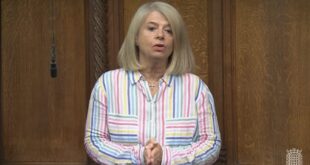“All of us, including me, have said that our public services need to be reformed”
Labour MP Darren Jones has become somewhat of a TikTok star as of late for his mauling of unscrupulous bosses and ill-equipped ministers who appear before him at the Commons Business and Trade Committee.
Clips of the Bristol North West MP, who has a keen eye for detail, holding bosses from the likes of Royal Mail and P&O to account for the disgraceful manner in which they have treated their workers, have gone viral. His brutal grillings of evasive ministers and hapless executives have also reignited interest in select committees and the crucial role they play in holding the powerful to account, at a time when many have grown increasingly frustrated at being able to get straight answers out of those in power.
We interviewed Jones for LFF, to find out what he thinks the future is for our public services, workers’ rights, the role of select committees and climate change.
One of the hapless executives who Jones has clashed with has been Simon Thompson of the Royal Mail over poor pay, working conditions and job security. In his role as Chair of the Business and Trade Committee, Jones has seen first-hand how workers’ rights and dignity are being undermined by firms like Royal Mail. At a time when polls show that a majority of the public support public ownership of key utilities and services, does Jones think that to protect workers and consumers they should be in public hands?
“All of us, including me, have said that our public services need to be reformed”, he says.
“Because we need to improve access and outcomes and we need to scale them up and we’ve got to ideally reduce the running costs because at the moment we can’t afford to pay all of our bills as a country and the only way we can do that is by using technology to modernise and transform the way we deliver public services.”
Jones has a particular interest in technology, having specialised in technology law in his legal career. He says that while Rishi Sunak views AI as the holy grail of public sector reform, he only partly agrees with him and thinks Labour would do things in a different way. It wouldn’t be interested in handing out the running of public services to big tech.
“I think that’s the new debate about privatisation versus how do you give the public sector the digital infrastructure and how do you give public servants the skills and training to transform the public services themselves, owned and operated by the state”, he says.
“I think that distinction between big tech, public servants and public service, I think that’s the start of the new debate around privatisation we need to have.”
Doesn’t the increasing use of AI and tech however have the potential to further undermine workers’ rights? At Amazon’s warehouses, the company has been accused of using algorithms to track and sack workers all as a result of what an algorithm has said.
“It’s how you do it”, says Jones.
“Most of the time technology is being done to people not being done with them, that’s the difference between an inclusive economic structure for technology adoption and an extractive economic structure, by which I mean, if you look at places like Amazon, Royal Mail, technology was being used to extract profit and for that to be taken away to shareholders and it was also being done in a way to extract power so it took power away from workers and collective organising.”
He adds: “I think if we’re going to make the best out of the opportunity of what technology is going to mean to people’s work in the future, workers are going to have to want to use it so it has to been seen as a positive experience, an opportunity to learn new things, to improve your skills and to improve the quality of your work.
“Until we flip that debate away from fear towards hope, I think we’re going down the wrong path not the right path on technology and workers’ rights.”
When it comes to the rights of workers and unions, according to the International Trade Union Congress (ITUC), the UK is among worst violators of trade union rights in Europe. Why does Jones think in the UK it’s particularly bad?
“It’s not so much workers’ rights, it’s the enforcement of workers’ rights”, he says.
“We have a third of the number of labour enforcement officers we should have for the size of our economy, according to the ILO requirements.
“That’s why with the P&O example, as the CEO was so confident in saying, “I know what the rules were, I broke them, I did it on purpose and I’d do it again, and he completely got away with it because we’re not enforcing workers’ rights and then there’s the whole backlog and access issue around the tribunal system and the justice system.
“We can write as many Labour laws as they want but if they’re not going to be enforced they’re meaningless. I still think there’s the need for a Labour rights bill which the Tories have promised and never delivered”.
Jones thinks workers should have a statutory right to be consulted on when tech is being implemented in a way which affects their work.
He has previously said that the two big macro policy areas are technology and climate change. When it comes to the latter, there’s been a concerted effort by the right-wing press and Brexiteers to push back against net-zero and even hold a referendum on the issue.
Does he think we need to be aware of the dangers such campaigns pose in our fight against climate change?
“The good news is public sentiment on the need to take action to tackle climate change is very high, the public have a good idea of what it entails”, he says.
“The problems are one, the government has failed to have the public debate at all really around climate change and by that I mean a lot of people don’t realise that their gas boilers are their largest source of carbon emissions beyond maybe flying on holiday and there’s a whole host of other things where the government should be funding public education campaigns.”
Jones says that some people will have to be given incentives go green on the paths to net zero. He says: “The state will have to play a role for people who can’t afford to do what they need to do, that’s why Ed Miliband and the team are talking about a nationally led but street by street approach to this work in partnership with local authorities, trying to make it as local as possible.”
When it comes to effective scrutiny and holding power to account, Jones has shown how effective select committees can be in getting answers out of people with a powerful clarity and exposing wrongdoing. Does he think however that they need ‘beefing up’ further in terms of their powers?
“I’m a huge fan of select committees, the floor of the House of Commons does certain things and a lot of the times it’s perhaps not the most dynamic environment and because of the number of members in there and the time you have, you can’t have a proper Q and A with ministers. So in departmental questions you’re bobbing up and down, you get to ask short question, you get a short answer and that’s the end of it, but if the minister chooses not to answer your question, there’s nothing you can do about it.
“In the select committees you have the time on a cross party basis to have proper scrutiny of the need to be accountable for their actions, whether they happen to be ministers or people outside of Parliament and you do that on the basis of evidence, and you have staff, budgets and powers to do that work. I think they’re the most interesting thing in the House of Commons really in terms of the role Parliament has and I’ve been thrilled that the public seen that and been more engaged with it.”
Jones’ performances at select committees wouldn’t have gone unnoticed by Labour leader Keir Starmer. Would he like to serve in the Shadow Cabinet and as a minister in a future Labour government?
“I would like to be a minister in a labour government”, he says.
“If I had the luxury of choice I would rather do something I know about rather than something I don’t know about, which I know sounds odd but in the Westminster context perhaps it’s not always the case. That would mean working on issues of technology which is one of my big things but so is business and energy and to a lesser extent national security issues, so if I was asked to do anything in any of those spaces I would be very happy to do so.”
Basit Mahmood is editor of Left Foot Forward
As you’re here, we have something to ask you. What we do here to deliver real news is more important than ever. But there’s a problem: we need readers like you to chip in to help us survive. We deliver progressive, independent media, that challenges the right’s hateful rhetoric. Together we can find the stories that get lost.
We’re not bankrolled by billionaire donors, but rely on readers chipping in whatever they can afford to protect our independence. What we do isn’t free, and we run on a shoestring. Can you help by chipping in as little as £1 a week to help us survive? Whatever you can donate, we’re so grateful – and we will ensure your money goes as far as possible to deliver hard-hitting news.
Source link



